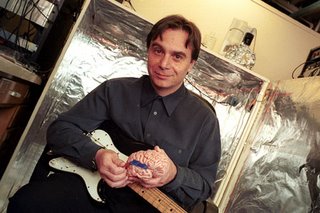Healing Music Ezine
You may have read about the studies that were done in senior residences
where music from the 40's and 50's was played during the day, in addition to
the decor being changed to 40's and 50's era furniture and kitchen looks?
This amazing study showed that the residents began to actu and think
younger and actually began experiencing better health! I do believe that when
you listen to the music of your courting years, things change inside of
you...chemically and neurohormonally! You actually do feel better and even if
part of it is just distraction, so what!!
I say if it helps, and doesn't hurt, and is doesn't cost you, go for it!!
What do YOU think?
Return to Top
If you're really interested in knowing about how music affects the mind and
the body, then you must understand the principle of rhythmic entrainment.
This is simply a documented phenomenon discovered
several hundred years ago by physicists. Basically it says that when two
bodies in motion are in close proximity, they will soon synchronize with each
other. Put it in plain English you say? OK. Imagine that the stereo suddenly
starts playing a march by John Philip Sousa. Would you sit motionless while
this stirring music plays? Absolutely not! Your toe would tap, your head would
nod, you might even feel compelled to get up and march around the room! It's
that powerful. I usually explain it to people as the process of the human
body's heart rate and breathing synchronizing to the pulse of strong rhythmic
music.
Return to Top
 At
the Harvard Medical School, Dr. Mark Tramo is doing research on how music
affects the brain. His research also suggests that even babies have specific
musical likes and dislikes. The dark stripe on the model brain he holds marks
an area particularly sensitive to rhythm, melody, and harmony. The good doctor
says that "They begin to respond to music while still in the womb. At the age
of 4 months, dissonant notes at the end of a melody will cause them to squirm
and turn away. If they like a tune, they may coo. "
At
the Harvard Medical School, Dr. Mark Tramo is doing research on how music
affects the brain. His research also suggests that even babies have specific
musical likes and dislikes. The dark stripe on the model brain he holds marks
an area particularly sensitive to rhythm, melody, and harmony. The good doctor
says that "They begin to respond to music while still in the womb. At the age
of 4 months, dissonant notes at the end of a melody will cause them to squirm
and turn away. If they like a tune, they may coo. "
"Music is in our genes," says Mark Jude Tramo, a musician, prolific
songwriter, and neuroscientist at the Harvard Medical School. "Many
researchers like myself are trying to understand melody, harmony, rhythm, and
the feelings they produce, at the level of individual brain cells. At this
level, there may be a universal set of rules that governs how a limited number
of sounds can be combined in an infinite number of ways."
"All humans come into the world with an innate capability for music," agrees
Kay Shelemay, professor of music at Harvard. "At a very early age, this
capability is shaped by the music system of the culture in which a child is
raised. That culture affects the construction of instruments, the way people
sound when they sing, and even the way they hear sound. By combining research
on what goes on in the brain with a cultural understanding of music, I expect
we'll learn a lot more than we would by either approach alone."
Imagine how wonderful it would be if music could provide one powerful path to
peace!
Return to Top
Alice
Alice H. Cash, Ph.D., LCSW
www.HealingMusicEnterprises.com
www.DrCashPrefers.com